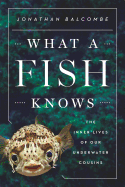
 Jonathan Balcombe (The Exultant Ark) is an animal behavior scientist and an animal rights advocate. In his fifth book, What a Fish Knows, he proposes that "fishes are individual beings whose lives have... value to themselves quite apart from any utilitarian value they might have to us.... The profound implication is that this would qualify them for inclusion in our circle for moral concern." To persuade the reader of this, he offers an enjoyable, surprising and sometimes gruesome exploration of the world of fish, written with clarity and humor and grounded in many scientific studies. He presents a spectacular variety of fish physiology, biology and behavior, and challenges myths about their level of awareness, their memories and their sensitivity to pain, asserting that "not only is scientific consensus squarely behind consciousness and pain in fishes, consciousness probably evolved first in fishes." He describes the unique qualities of their senses, including some that we have only recently begun to understand, such as electrical sensitivity, and geomagnetic sense, involving magnetite particles in the nostrils of certain fish that act like compass needles. Their documented curiosity, playfulness, learning ability and emotional responsiveness are likely to surprise many readers. Wrasse use rocks to smash shellfish, archerfish learn from each other how to hunt insects by shooting water at them, tigerfish chase low-flying swallows and snatch them out of the air. Fish can solve puzzles and notice patterns that elude primates. "Fishes are individuals with minds and memories, able to plan, capable of recognizing others, equipped with instincts but also able to learn from experience. In some cases fishes have culture."
Jonathan Balcombe (The Exultant Ark) is an animal behavior scientist and an animal rights advocate. In his fifth book, What a Fish Knows, he proposes that "fishes are individual beings whose lives have... value to themselves quite apart from any utilitarian value they might have to us.... The profound implication is that this would qualify them for inclusion in our circle for moral concern." To persuade the reader of this, he offers an enjoyable, surprising and sometimes gruesome exploration of the world of fish, written with clarity and humor and grounded in many scientific studies. He presents a spectacular variety of fish physiology, biology and behavior, and challenges myths about their level of awareness, their memories and their sensitivity to pain, asserting that "not only is scientific consensus squarely behind consciousness and pain in fishes, consciousness probably evolved first in fishes." He describes the unique qualities of their senses, including some that we have only recently begun to understand, such as electrical sensitivity, and geomagnetic sense, involving magnetite particles in the nostrils of certain fish that act like compass needles. Their documented curiosity, playfulness, learning ability and emotional responsiveness are likely to surprise many readers. Wrasse use rocks to smash shellfish, archerfish learn from each other how to hunt insects by shooting water at them, tigerfish chase low-flying swallows and snatch them out of the air. Fish can solve puzzles and notice patterns that elude primates. "Fishes are individuals with minds and memories, able to plan, capable of recognizing others, equipped with instincts but also able to learn from experience. In some cases fishes have culture."Humans kill billions and possibly trillions of fish every year, mostly through our fishing industries, more than enough to make an end-to-end line reaching to the sun and back. Discarded fishing nets and lines kill many more, plus mammals and birds. "It is easy to condemn the cruelty and waste rampant in the commercial fishing industries. But consumers of fishes must acknowledge their complicity." Balcombe ends with an appeal to include the fishes in our "moral community"--"With the rise of human reason, and a growing awareness of our interdependence with all life, humanity is on a course toward a more inclusive, more enlightened era." Readers may not share all of his interpretations and conclusions, but the breadth and depth of his research and his enthusiastic storytelling may permanently alter how they look at a pet goldfish or a can of sardines. --Sara Catterall
Shelf Talker: An entertaining and enlightening study of fish behavior and sensibilities by a biologist and animal welfare advocate.

